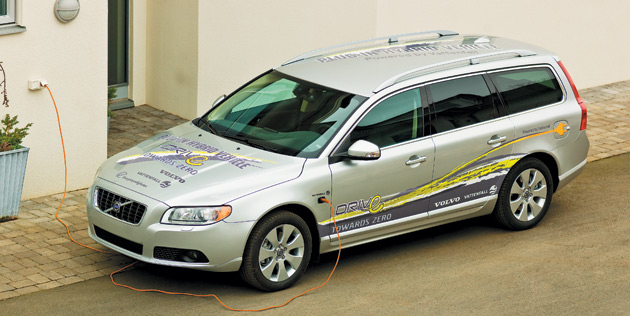Volvo has long nurtured its reputation for some of the safest cars on the roads, but now the automaker plans to add some green to its safety. The company will add both clean diesels and plug-in hybrids to its U.S. lineup to meet new, more stringent fuel economy rules.
The company has long offered diesel models in Europe, where oil-burners now represent half the new cars sold. In most European countries, diesel fuel is taxed far less than gasoline, so their lower fuel costs and better fuel mileage offset the higher initial costs of diesel engines.

volvo drive motorauthority 004

Volvo DRIVe low-emissions range to debut at Paris

Volvo has formed a joint-venture with Swedish utility Vattenfall to help develop its plug-in hybrid technology
Diesel less attractive in U.S.
In the U.S., however, not only does diesel fuel cost roughly the same as gasoline, but more stringent emissions limits require fitment of sophisticated aftertreatment systems to remove fine particulates from diesel exhaust. Which is why we haven't so far seen such Volvo models as the latest 2009 Volvo S80 turbodiesel.
Doug Speck, who runs Volvo in the U.S., said the company will add both clean diesels and plug-in hybrids to its lineup, as well as more fuel-efficient models, to meet fuel economy standards that will reach 42 mpg for cars by 2016.
Model mix a work in progress
The company's plan is still a work in progress, though. Speck admitted "it's ultimately unclear" how model lineups will split among smaller, more efficient gasoline engines, diesels, hybrids, and plug-in vehicles. In January 2007, it partnered with Swedish utility Vattenfall to develop plug-in technology for vehicles.
Last fall, the company released a range of products demonstrating its "DRIVe" technologies to improve the efficiency of its range across the board.
Volvo didn't release dates for U.S. release of any advanced powertrains. Like other manufacturers, Volvo will fit direct injection to its current engines and improve the efficiency of its transmissions to boost its gas mileage ratings.
Diesel plug-in by 2012
The company did say it will release what it calls a diesel-electric plug-in hybrid in Europe by 2012, joining pioneer Peugeot as one of the few companies to pair hybrid drive with a diesel engine.
The Volvo vehicle, however, will cover the daily travel needs of three-quarters of European drivers--up to 30 miles--by traveling on electric power alone. Its small diesel engine will recharge the battery thereafter, giving a total range of more than 700 miles.
Volvo quotes a fuel consumption of 1.9 liters per 100 kilometers for the car over a combined test cycle, which translates to 124 miles per gallon. Its emissions of carbon dioxide (CO2) are likely to be so low that it will win both favorable tax treatment and purchase subsidies from various governments.
The company says cautiously that plug-in hybrid technology will be "viable for certain customer categories" by 2012.
Volt-like "series" hybrid
Volvo's technology is the same "series hybrid" system used in the 2011 Chevrolet Volt extended-range electric vehicle. That contrasts to the "plug-in hybrid" obtained by adding a larger battery pack (which can be recharged from wall current) to a conventional hybrid like the 2010 Toyota Prius.
As with the Volt, Volvo's production of its series hybrid is likely to be quite low in early years, until the cost of the lithium-ion battery pack falls to more practical levels.
Diesel "full" hybrid: Postponed
Volvo also noted, well down in its press release, that it will postpone its plans for a "full" diesel hybrid powertrain. It appears to be placing its bets on a diesel series hybrid. In that system, the wheels are turned purely by electric motors, rather than the combination of electric and mechanical drive in "power-split" hybrid system like Toyota's Hybrid Synergy Drive.
[Automotive News (subscription required) via MotorAuthority]













